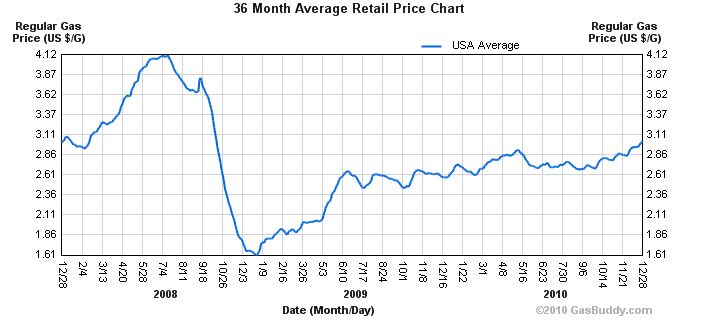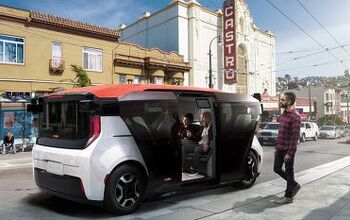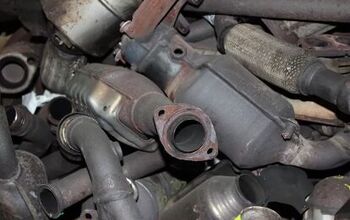Former Shell President Predicts $5 Gas By 2012: SUV Shock Coming?
Speaking to CNN, former Shell Oil President John Hofmeister warns that, although American oil consumption may have already peaked, high prices at the pump could come back with a vengeance over the short and medium term.
The issues that gave rise to high priced gasoline in 2007 and 2008 are repeating themselves, except the world demands even more oil in the next several years than before. Asian growth is continuing, e.g. 17 million new cars per year just in China, and will demand more oil. U.S. economic recovery has brought demand back to where it was before. Economic growth means even more demand. But the U.S. Government is prohibiting expansion of U.S. domestic crude oil production which puts upward pressure on global crude oil prices… If we stay on our present course there is no question but that prices will rise to the $5.00 gallon level by 2012 in my opinion.
With profits returning to the auto industry in large part thanks to rebounding sales of large cars and SUV/Crossovers, this is the kind of warning that should ring out in the headquarters of the major manufacturers. Gas prices have been on a subtle upward trend since bottoming out at just over $1.60 in December of 2008, and the national average seems to be creeping up to the level it was at before it skyrocketed to over $4/gal in the Summer of 2008. Which makes you wonder: will the automakers be better prepared to deal with a spike in gas prices this time around?
On the dealer level, it’s clear that trade-in values on large SUVs are hurting, even though sales of new trucks and SUVs are generally on the rise. CNW Marketing tells USA Today that SUV resale prices are tracking some 20 percent lower than Kelley Blue Book list value. That would be bad enough if dealers weren’t so desperate to move new trucks and utes that they’re willing to take on the trade-ins regardless. One anecdote tells the story:
“It’s a challenge,” says Adam Lee, president of the family-run Lee Auto Malls dealerships in Maine. “How do you tell a good customer, ‘You paid $32,000, and now it’s only worth $17,000?’ ”
The answer: delicately. Lee says his sales force has been making SUV trade-in deals by “pretending there’s no energy crisis when we take them.”
Students of the Carpocalypse can tell you how much good “pretending” does when your business relies on externalities like credit availability and fuel prices: not much. Reality is reality, and in the words of one of KBB’s Alec Gutierrez in Automotive News [sub]
The days where a dealer could just go to auction and stock up on a bunch of SUVs and hold them for 40 or 60 days are over.Again. Meanwhile, Gutierrez puts a brave face on the situation, pointing out thatThe , the , the and the — the compact crossover segment — that’s where we’ll see a lot of growth in terms of production and sales overall. The American consumer still generally wants to have a vehicle that offers a lot of utility but at the same time they are conscious of the fuel economy that the vehicle offers and what they are going to pay at the end of the month.And he’s right… as long as gas prices increase steadily. When gas goes up sharply, American consumers quickly abandon their incremental approach to downsizing and start outbidding each other on used Geo Metros.If you see a 20-to-30 cent price increase per gallon over the course of a couple weeks then of course people are going to panic, but if it increases steadily over time that gives the market a chance to react rationallyAnd that’s the scenario that has got to be scaring production planners at the major OEMs. Right now, the transition from truck-based utes to crossovers reflects about two years of steady gas price increases, but if those increases accelerate due to the factors identified by Hofmeister, even the hot compact CUV segment could take a beating. Firms like Ford and Hyundai, which have inexpensive 40 MPG vehicles on the market (and, to a lesser extent, Nissan, which has the cheapest freeway-capable EV in the US) could be poised to capitalize on such a hike, but truck-dependent firms with nothing inexpensive-but-efficient to offer, like Chrysler, are going to keep a nervous eye on those pump prices. History proves that dramatic shifts in gas prices can cause disproportionate reactions from consumers, making a period of uncertainty like this one a scary proposition.More by Edward Niedermeyer
Latest Car Reviews
Read moreLatest Product Reviews
Read moreRecent Comments
- Ger65691276 I would never buy an electric car never in my lifetime I will gas is my way of going electric is not green email
- GregLocock Not as my primary vehicle no, although like all the rich people who are currently subsidised by poor people, I'd buy one as a runabout for town.
- Jalop1991 is this anything like a cheap high end German car?
- HotRod Not me personally, but yes - lower prices will dramatically increase the EV's appeal.
- Slavuta "the price isn’t terrible by current EV standards, starting at $47,200"Not terrible for a new Toyota model. But for a Vietnamese no-name, this is terrible.


































Comments
Join the conversation
Five dollar gas - GM's dreams for the Volt will finally come true.
We are once again facing a looming economic apocalypse: the return of rapacious oil price speculation. This egregious situation demands the immediate attention of our elected leaders to correct the horrendous mistakes of the past. Oil speculation in 2008 was the last straw that precipitated the severe worldwide recession, and is now returning and threatening to destroy the fragile economy and bring about a double-dip recession. What most people don’t know is that U.S. margin rules of the Commodity Futures Trading Commission allow speculators to buy a crude oil futures contract on the Nymex, by having to pay only 6% of the value of the contract. This means that a hedge fund only needs to put up $1 to control $16 worth of oil futures. This is unique to oil among all commodities, and this extreme leverage of 16 to 1 drove oil prices to wildly unrealistic levels in 2008, and is happening again. This loophole and inequity must be stopped immediately. As many economic experts have testified before Congress, the vast majority of oil futures trading now comes not from end-users but from unregulated futures speculation by predatory hedge funds, banks and financial groups using futures exchanges and uncontrolled inter-bank or Over-The-Counter trading to avoid scrutiny. Hedge fund managers have testified before Congress and admitted that their speculation had driven prices. While “demand in China” is certainly a factor, it is not this which is fueling the current immediate price increase – oil trading is done in U.S. dollars and largely on U.S. financial exchanges by U.S. hedge funds. Yet, no action has been taken to protect the American people. The price of gasoline is rising again, in contrary to the fundamentals of supply and demand, just as it did in 2008. I have the misfortune of having to extensively interact with many hedge fund managers. They have boasted of their driving up the price of oil in 2008. They have greedily looked for and openly talk of the opportunity to “reinflate the bubble”, and are now gleefully rubbing their hands in repeating that disaster. They have taken Presidential and Congressional inaction on this issue to be tacit approval to once again do the same thing. This artificial manipulation of the oil market must be stopped immediately. Of course the supply of oil in the Earth’s crust is limited, and will run out – in the foreseeable future – and alternative sources of energy must be developed. However, that is not what is happening today. If you do not want to see gas prices exceed $4 (or $5, or higher) a gallon in the near term – and for your hard-earned money to be siphoned off into the pockets of hedge-fund managers and oil companies – write to your Congressional representatives and Senators and demand that they immediately put forth legislation to direct the CFTC to eliminate the 16 to 1 leverage allowed for oil speculation, which will allow the price of oil to reflect true supply and demand. Hedge funds avariciously plundered our country and stole from the American people for their own personal profit, and cannot be allowed to destroy the fragile and floundering economy. I have personally heard it from many of these charming people…. This is not about people wanting to drive big SUV’s – this is about preventing the collapse of the U.S. economy, and protecting our ability to simply live. Oil is a strategic resource for which financial manipulation cannot be allowed – our needs must come before the influence of oil industry lobbying money. This single action would do more to help rejuvenate the economy than anything else. Artificially high oil prices cost Americans hundreds of millions of dollars per day – money which is once again being siphoned to oil related companies, which could otherwise go to rebuilding the economy. While no one wants taxes increased, if we were able to take the long view, at the same time this also presents a unique opportunity to enable a true energy independence plan. If oil speculation were ended and the price of oil dropped to its current supply-and-demand level of around $30-$40, the price of gas at the pump would also likewise drop significantly. The federal tax on gasoline could be increased – which would still keep pump prices below where they are today – and the tax revenues dedicated to implementing a true energy independence program based on solar, wind, and renewable biofuels (or even coal liquefaction in the short to intermediate term). With all the money that was unproductively wasted on the TARP program and various corporate bailouts, and the current climate of reducing government spending, there will not be another major government initiative for the foreseeable future. This type of program is probably the only chance to fund renewable energy resources, which will simply not come from the private sector in time to do any good, because investors are too short-sighted and will not invest in anything that does not give an immediate return. Talk about a “free market” is all well and good, and as an entrepreneur, I am a big fan of a “free market”. However, we should also realize that a “free market” and inadequate controls are what led us to the global financial mess we are now in, with a $13 trillion national debt (compared to the $800 billion surplus a decade ago), excessively easy credit which led to the collapse of the real estate markets, and financial manipulation of the oil markets. Unchecked and left to their own devices, Wall Street will find ways to manipulate the system for their own profit – at the expense of most of the rest of us. I work with these people every day (and have to shower thoroughly every night to scrub the stench off), and I know that they cannot be trusted in a totally “free market”, which brought us the current insane margin rules for oil trading. Congress won’t do this on its own. Legislators in both parties have been extensively lobbied by the oil companies, and receive multiple millions in “campaign contributions”. I have also had the dubious pleasure of spending enough time in Washington meeting with Congressional representatives to personally see the power of “lobbying” money. They won’t act unless they feel strong pressure from us, and they get the message that they won’t be re-elected unless they do this. Don’t let history repeat itself – write to your Congressional representatives and demand action. For a thoughtful analysis of the situation, check out the following story by Ed Wallace from Bloomberg: http://www.businessweek.com/lifestyle/content/dec2010/bw20101230_850060.htm